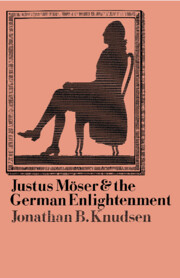Book contents
- Frontmatter
- Contents
- Preface
- Acknowledgments
- Abbreviations
- 1 Justus Möser in the German Enlightenment
- 2 Möser's social universe: urban notability and Enlightenment intelligentsia
- 3 Möser's political universe: secular politics in a confessional state
- 4 Moser's historical universe: regional history and cosmopolitan history
- 5 The party of incremental movement: social and economic reform in Möser's Osnabrück
- 6 Möser's social theory: local patriotism and the defense of the estates
- 7 The dialectic of Enlightenment: the debate over theory and practice
- Bibliography
- Index
- Frontmatter
- Contents
- Preface
- Acknowledgments
- Abbreviations
- 1 Justus Möser in the German Enlightenment
- 2 Möser's social universe: urban notability and Enlightenment intelligentsia
- 3 Möser's political universe: secular politics in a confessional state
- 4 Moser's historical universe: regional history and cosmopolitan history
- 5 The party of incremental movement: social and economic reform in Möser's Osnabrück
- 6 Möser's social theory: local patriotism and the defense of the estates
- 7 The dialectic of Enlightenment: the debate over theory and practice
- Bibliography
- Index
Summary
I was led by a deep sympathy with the emigres and misfits of German society to study a figure who belonged to its mainstream. My attachment to twentieth-century culture took me back to its eighteenth-century foundations, and my involvement with the course of European socialism brought me to an ancestor of modern conservatism. The choice I made – to study Justus Möser's place in the German Enlightenment – was a scholarly one, and has remained so over the years this work has taken. I admit that Möser has often fascinated me, but I have never grown comfortable in his world or come to accept his values. But if the reader will find no apologia for Gemeinschaft or German paternalism here, neither will he or she find a simple condemnation of Möser's views or reform efforts. Instead, I have tried to present a broadly conceived intellectual biography that describes the problems facing German reformers in the later eighteenth century, but that provides no easy answers to the question: What could have been done?
Justus Möser (1720–94) was one of the pivotal figures in the German Enlightenment. He was an unusual commoner in a political world dominated by the German nobility, and he had broad political and administrative power in his northwest German state, the bishopric of Osnabrück; furthermore, he combined this power with a distinguished career as journalist, historian, and man of letters. His attraction for later readers rests in the numerous essays he wrote on politics, public morals, society, and the economy – essays that he collected as the Patriotic Phantasies – and in his pathbreaking Osnabrück History.
- Type
- Chapter
- Information
- Justus Möser and the German Enlightenment , pp. ix - xiiPublisher: Cambridge University PressPrint publication year: 1986

